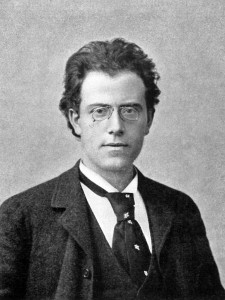Gustav Mahler was born on July 7, 1860, in Kalischt, Bohemia. Gustav was the second of twelve children born to Bernhard and Marie Mahler. Gustav exhibited early musical talents and his parents began paying for piano lessons. Gustav’s preformed his first public recital at the ten, before finding his way to study at the Prague Gymnasium and Vienna Conservatory.
Gustav studied piano, harmony and composition at his universities. Gustav was later able to take on teaching and composed his first work, “Das Klagende Lied.” Mahler original repertory consisted solely of light opera; but an unhappy love affair with one of the singers led to his first masterpiece, the song cycle “Lieder eines fahrenden Gesellen,” and later his “First Symphony.” (Grove Music ,2013)
“Having lived a divided life of triumph and heartbreak, of optimism and hopelessness, it is only fitting that the music of Gustav Mahler portrays such conflict and arouses varying reactions in listeners, from fierce adoration to outright dislike.” (Ramos, 2014)
The personal life of Mahler, even with his success and legacy, was remarkably troubled. Living in the time of great propaganda and race, especially a time period against Jews.
Mahler’s Jewish background made him even more of a target for Vienna’s racist newspapers, imposing pressure to which he later caved.
Gustav’s unique style could be at times much for performers but other loved his leadership. Mahler held harsh rehearsals and how he dealt with his musicians was widely criticized but others believed that is what put his performances at another level.
Mahler’s primary style was late-Romantic that also used the fin-de-siecle mood. He helped revolutionize the Romantic style and the way performances around Europe were done. He was at the fore front of composing, helping lead the revolutionary style. The late romantics lead a revolt mainly against social and political norms from the former “Age of Enlightenment.”
Mahler’s main ability was to represent the the individuals versus the vices of the world. He broke social norms such as doing more than the previous excepted four movement work and embracing a style of feeling that not many exemplified prior. Mahler looked to write music that spoke for itself not for anyone or thing a style that would influence many after him.
His combination of styles caught Europe’s intrigue. Gustav always pushed his pieces to its limit. His Eighth symphony was split into two parts and held over a thousand performers. Although his performances were controversial it set the ground work for composers to later carry on his style. He was just a little before his time. (Ramos, 2014)
Sources:
Composers Biographies by GroveMusic (2013). Mahler, Gustav. Retrieved from: http://www.pbs.org/wnet/gperf/education/mahler.html
Ramos, P (1995). Classical Net. Gustav Mahler 1860-1911. Retrieved from: http://www.classical.net/music/comp.lst/mahler.php

